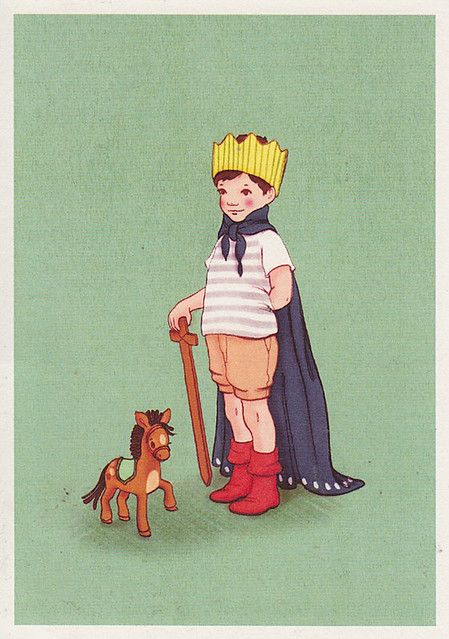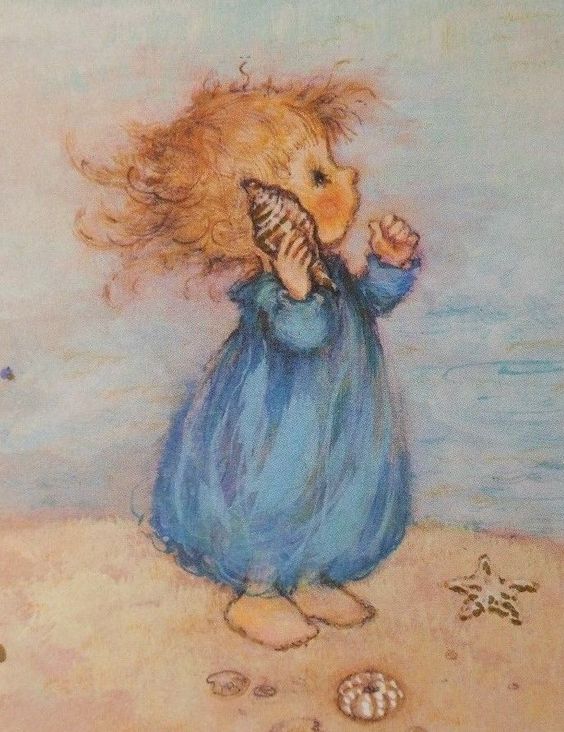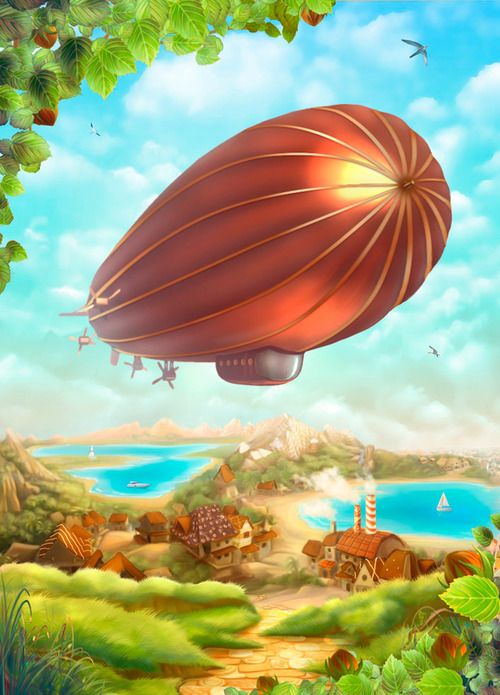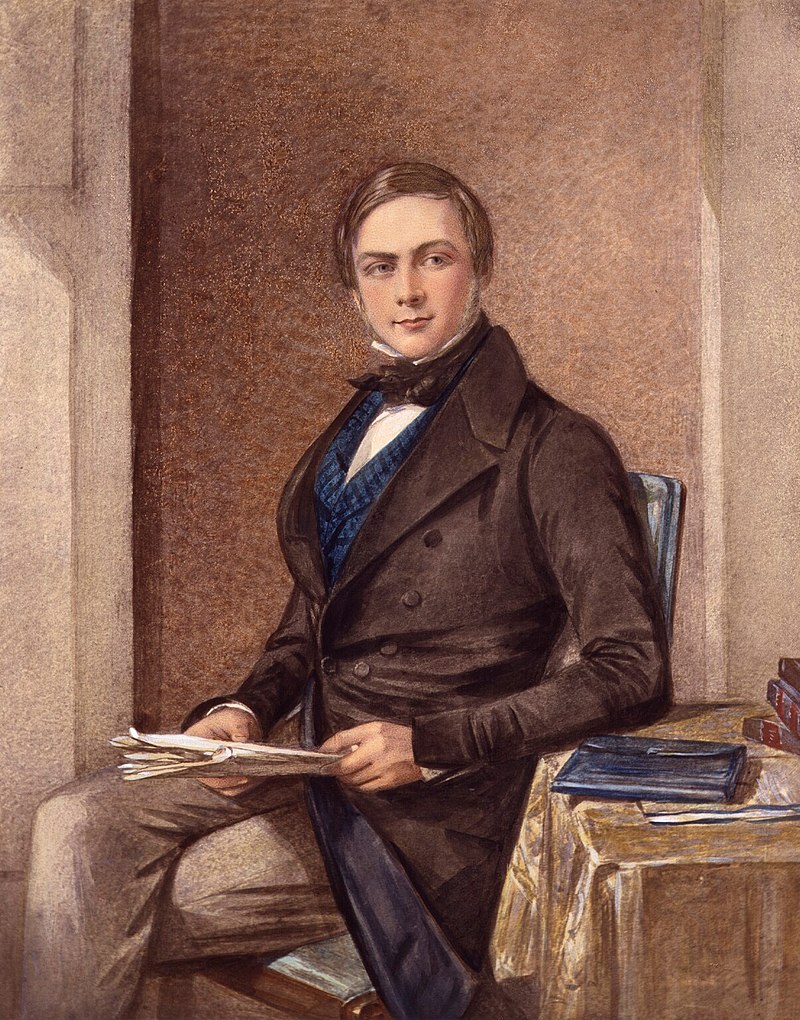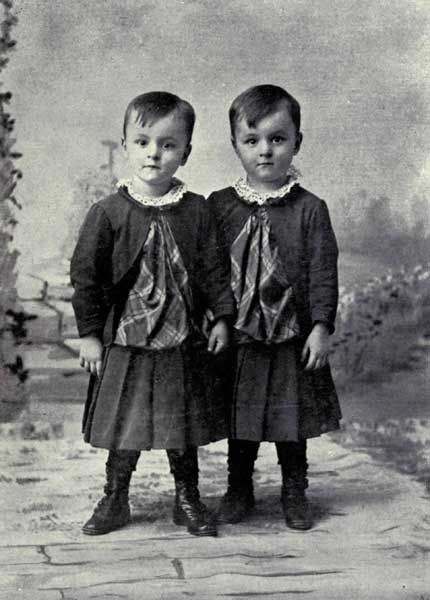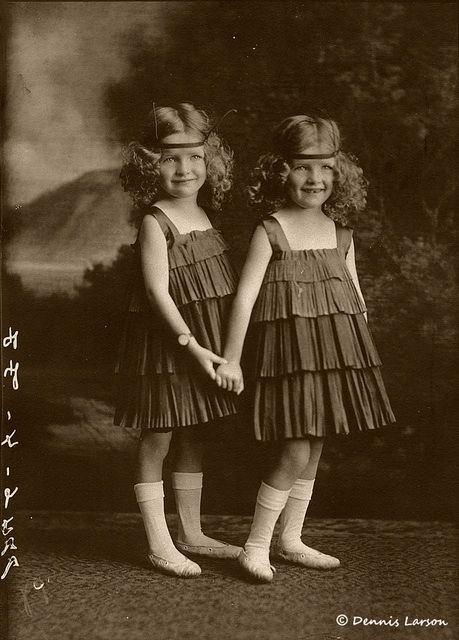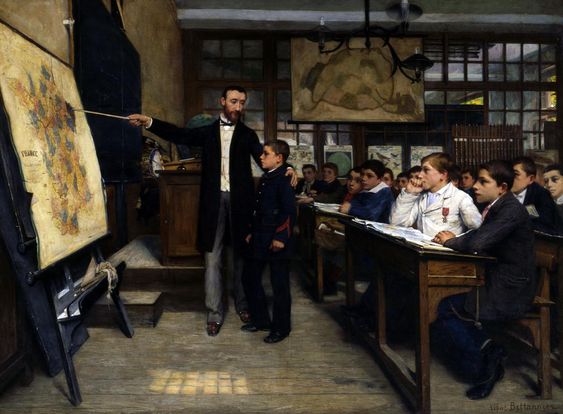
Once upon a time, a
poor man who had a large family left England to go and see if he could
find a better living for himself across the seas. There were many others
on board the ship, and for a time all went well; but when they were
nearing the end of their journey, a great storm arose. The winds blew,
the waves rose and roared, and broke upon the ship; and at last they
were very glad to be able to let her drift aground on the nearest land,
which they found to be an island on which no one was living.
They all got safely
to shore; and as the ship was broken up by the wind and the waves, they
were able to get many planks, and nails, and other useful things from
the ship, and from its cargo, with which they built themselves houses,
made spades and ploughs, so that they were not so badly off after all.
They had plenty of corn to last them until they could grow some more,
and for a time all went well. But after they had got a good crop of
corn, they had to grind it into flour, and this took a long time. There
were no flour mills on the island, and John Jobson for that was the name
of the laboring man, had to spend hours every day grinding the grain
into flour for his wife and family to eat.
One day, after he
had been grinding until his back ached and his arms were very tired, he
began to be in despair. If it took him so much time grinding his grain,
he would have no time left to look after the little farm which he had
laid out. His little boys, although they had great appetites and ate as
much bread as their mother could make out of the flour which their
father ground between the two millstones, were not strong enough to help
him. All the other settlers were just in the same position. They had no
machines to do any work for them. Everything had to be done with their
hands. There were no people to hire as servants; and if there had been,
they could not have paid them any wages, for they were poor and had no
money. So Jobson became very down hearted, and not knowing what to do,
thought he would take a stroll in the country and think over things.
He climbed up some
rising ground, and walked a long way among the hills, wondering what on
earth he should do if he could get no help. He was going up a little
valley, which turned suddenly, and there to his great astonishment he
saw a monstrous Giant. He was terribly scared, and would have run away
as hard as he possibly could, but on taking a second look at the giant
he saw that he was asleep. Jobson looked again, and wondered at the
immense size of the giant. He could hardly see to the end of him, and he
saw that he was enormously strong; yet he looked so harmless and
good-humored, that Jobson stood gazing on him till his fear was nearly
over. He was clad in a robe of dazzling brightness where the sun shone
upon it, but the greater part was shaded by the trees; and it reflected
all their different colors, which made it look like a green changing
silk. As Jobson stood, lost in amazement, the giant opened his eyes, and
turned towards him with a good-humored smile.
As soon as Jobson
saw him open his eyes he started to run again, feeling sure that he
could have no chance if so huge a giant were to catch him; but as he ran
the giant spoke. He was still lying down on his back in the grass, and
his voice was gentle and kind.
"Do not be afraid," he said. "I will do you no harm."
"But you are so big," said Jobson, looking timidly at the giant, and making ready to run the moment the giant stirred.
But the giant did not stir. He said, "Yes, I am very strong and very big, but I will do you no harm."
As he still lay and
smiled kindly, Jobson came nearer to him, and at last all fear began to
leave him. Then he asked the giant who he was.
"My name," said the giant, "is Aquafluens."
"And where do you live?" said Jobson.
"I live in the island. I have always lived here, long before you came."
"Then does it belong to you?" said Jobson, fearing that the giant might treat him as a trespasser.
"I do not know," said the giant. "What does 'belong' mean?"
Jobson thought it
was a queer question, but said nothing. Then Jobson began to think
whether it might be possible to get this good-natured giant, who seemed
so strong, to help him in his work. "Do you ever work?" he said to the
giant.
"Oh yes," said he; "I can work if you will set me work to do. I like it. All work is play to me."
Then Jobson's heart
was glad within him, and he thought to himself, "Here is one who could
grind all my corn with his little finger, but dare I ask him?" So he
thought for a time, and then he said, "You said you would work for any
one?"
"Yes," said Aquafluens, gently, "for any one who will teach me to work."
"Then," said Jobson, "would you work for me?"
"Yes," said the giant; "if you will teach me."
"But what wages must I pay you ?" asked Jobson.
Then the giant
laughed, and said, "What queer words you use. You say 'belong.' What
does 'belong' mean? I do not know. You say 'wages.' What are 'wages'? I
have never heard of them."
At this Jobson
thought the giant must be mad, and he was a little afraid; then again he
thought to himself, "Perhaps he is not mad, but only weak in his head.
Giants, they say, are often not very wise." So he tried to explain.
"What shall I give you if you work for me?"
"Give me?" said the giant; "what a joke! You need give me nothing, I will work for you for love."
Then Jobson could
hardly believe his ears, but he thought he would go home at once and
tell his wife the good news, that he had got a great, strong giant who
would work for him for nothing.
"Where are you going?" said the giant.
"I am going home to tell my wife."
"Had you not better let me carry you?" said the giant.
Then Jobson was frightened in his heart. "Perhaps if I say yes the giant will swallow me alive." But he did not tell him so.
"How can you carry me?" said he.
"I can carry you any way you like," said the giant, "so long as the road goes down hill."
"Oh, it is down hill all the way!" said Jobson.
"Then," said he, "you must get upon my back, and I will carry you there as quick as you like."
Jobson was afraid,
for when he came to look at the giant's back, and put his hand upon it,
it sank right in; then he saw that the skin was so soft that, when you
pressed upon it, it gave way under your hand, or your foot, and you
seemed to sink right into the giant's back. So Jobson was terrified, and
screamed as he pulled his hand out of the hole that he had made in the
giant; but to his surprise the hole closed up, just as if he had never
thrust his hand in. But his hand was wet with the giant's blood. It was
such queer blood; it was quite cold, and it had no color.
Then the giant said,
"That will never do, for you are so small and so heavy for your little
size, that you would sink into me if you tried to sit on my back."
"But what can I do?"
said Jobson. The giant took a tree-trunk which was lying close at hand,
and put it on his shoulder. "Now," said he, "jump onto this trunk, and I
will carry you safely."
Jobson was very
frightened when he sat on the log, for he thought nothing would be more
likely than for the log and himself to sink out of sight in the giant's
body, but he soon found that although the log sank in a little way, it
did not sink in far enough for him to touch the giant's body with his
feet. He was very glad, for he felt all wet and cold where his arm
seemed to have gone through the giant's skin. "You had better have a
pole with you to steady yourself with." Jobson picked up a long stick,
and climbed up once more onto the giant's shoulders, where the great log
lay; he seated himself, and waited with terror for the giant's
movement. He thought that if he had seven-league boots he might throw
him up into the air. He would fall off, he was sure; but, to his great
surprise, the giant neither jumped, nor stepped, nor ran; he seemed in
the strangest way to glide, without making any noise, down the valley,
across the hill to the place where his cottage stood. When they came
within sight of the cottage his wife and children were standing on a
little hillock looking for him, and when they saw him seated on the
shoulders of this strange monster they nearly had a fit with fright. The
children ran into the house, and the wife fell at the feet of the great
giant, saying, "Have mercy on my poor husband!" But the giant laughed
and lay down on the grass: then Jobson jumped off the trunk and told his
wife of the glad news, that this was a good giant, and that he would do
all their work for them. The children came out of the house and looked
timidly at the monster, who, as soon as he had lain down, closed his
eyes and seemed to be sound asleep.
Jobson went into the
house to tell his wife all of the wonderful story of the giant, but his
wife did not seem to like the idea of employing the giant.
"But he will work for nothing, wife," said Jobson.
The wife shook her
head. "That is all very well," she said; "but think of the food he will
eat. He would swallow all the food we have in the house for breakfast,
and we should starve."
The husband
scratched his head, and said he had never thought of that. "But," he
said, "let us go and ask him how much food we must give him."
"And what drink he will want, and where will you put him up?" said the wife.
Jobson began to believe that his workman was not such a good bargain after all.
So when they drew near to the giant, he opened his eyes and asked what was the matter.
Jobson said they were afraid they would not be able to put him up in their house, as he was too big to enter at the door.
"Oh," said the giant, "that does not matter, for I never live in a house. I will simply sleep here in the grass under the sky."
"But," said Jobson, "we are afraid that we shall not be able to feed you."
"Feed me?" said the
giant, laughing, with a little ripply murmur that shook all his body.
"Who asked you for any food? I never eat anything."
Then Jobson's wife
was frightened, and said she was afraid that there must be something
uncanny about him. But Jobson went on asking:
"What do you drink?" said he.
"Only fresh water," said the giant.
Jobson was very pleased, and looking in triumph at his wife, said to him:
"And how much work can you do in a day?"
"As much as you like," said the giant.
"But I mean," said he, "how many hours will you work?"
"As many hours as there are on the face of the clock," said the giant.
"You mean twelve," said the wife.
"No," said the giant. "I mean all the hours that are in a day."
"What!" said Jobson, "never stop night or day? And do you never sleep?"
"When I have nothing to do," said the giant, "I sleep, but as long as you give me work I will go on working."
"But do you never get tired?" said Jobson.
"Tired !" said the
giant, "I don't know what that is. That is another funny word. What a
queer language you speak. What is being tired ?"
Then Jobson looked
at his wife and his wife looked at him, and they said nothing for a
little time. Then they asked him when he was ready to begin.
"At once," he said; "as soon as you have put things right for me."
"What things?" said they.
"I told you I can
only work going down hill. If you want me to work hard you must let me
have some place that is very steep, and make a step ladder for me to go
down on. If you will fix a wheel with steps on it, so that I can step on
the steps and make the wheel go round, I can do anything you like."
"Could you grind corn?" said Jobson's wife.
"I can grind stones," said the giant, laughing.
So Jobson and his
wife set about building a mill with a step wheel for the giant. They
connected a big wheel for the giant to step upon with grindstones on the
inside of the mill, so when the giant stepped upon the wheel outside,
he made the millstones inside go round and round and grind the wheat.
When it was all finished they came to the giant and asked him if he was
ready to begin.
"Yes," he said.
"Begin then," said Jobson.
And the giant slowly
and steadily stepped first on one step of the wheel and then on another
until it began to go round and round, and the millstones went round and
round, and so it went on until the whole of a sack of corn was ground
into flour, and still the giant went on, and on, and on.
"Are you not tired?" said Jobson to him.
"I don't know what you mean," said he.
"Well, now," said Jobson, "do you think you could get me some stones from the quarry?"
"Easily," said the giant. "But what have I to carry them in?"
Then Jobson made a
long box and put it upon the giant's back; but he found that it was not
so easy going, for the road was quite flat, and over and over again the
giant stopped. He could go very well down hill, but on level ground he
needed to be poked along with a long pole which Jobson carried. When it
came to the least down hill, he went as quick as could be. This bothered
Jobson a great deal, for he saw that if the giant could only go down
hill, he could not be nearly so useful as if he could go both ways. So
he spoke about it to the giant once, and he laughed and said: "Hum! you
must get my brother, he could help me to go as quick along the level
ground as I do when I am going down hill; but even he could not make me
go up hill. Is there not plenty of work I can do without that?"
"Certainly," said Jobson; and soon he had the giant set to work to make all kinds of things.
When he had ground
all the corn, they took away the millstones and fixed up a saw which had
come ashore from the wreck. They found that the giant could saw wood as
well as he could grind corn. They asked him if he would bring down the
trees from the hills, with which they could make planks to floor their
cottage.
"Nothing is easier,"
said the giant; and when the logs came down, he sawed them all up into
planks, and soon the Jobsons were so comfortable that they not only had
enough planks for themselves, but they had more than they wanted, so
they gave them to the neighbors. Every one was very anxious to find out
if there were any more giants in the island, because they could see that
Giant Aquafluens was more useful than twenty men. He never ate, he
never slept, he only drank cold water, and day and night he would go on
working as regularly as if he were a machine. Only, when the sun got
very hot, and he could not get any water to drink, his strength seemed
to wither away, but a good heavy shower of rain set him up in time, and
then he would work away as hard as ever.
One day Jobson asked
him where this brother of his could be found. "You will find him
usually on the hilltops," said Aquafluens; "but occasionally he comes
sweeping down, and disturbs me in the grass where I am lying."
"Can he do as much work as you?"
"When he Is in the
humor, but sometimes he is not; and sometimes he gets into a frightful
temper, until you think he is going to destroy everything. He even gets
me mad sometimes," said Aquafluens.
At this Jobson was
silent, and wondered greatly, for he had never seen his good giant in a
passion. He told all this to a neighbor called Jackson, who was very
anxious to have a giant of his own; and no sooner did he hear that the
stormy-tempered brother of Aquafluens lived on the hilltops, than he
went out into the mountains to see if he could find him.
At length, one day,
Jackson, climbing a high rock, saw a magnificent figure seated upon the
summit. He could scarcely distinguish the shape for his eyes were
dazzled by its brightness; but what struck him most were two enormous
wings, as large as the sails of a ship, but thin and transparent as the
wings of a gnat. Jackson doubted not but that this was the brother of
Aquafluens. Alarmed at the account he had heard of the uncertainty of
his temper, he hesitated whether to approach. The hope of gain, however,
tempted him, and as he drew nearer he observed that he also had a
smiling countenance. So mustering up courage he ventured to accost him,
and inquire whether he was the person they had so long been in search
of, and whether he would engage in his service.
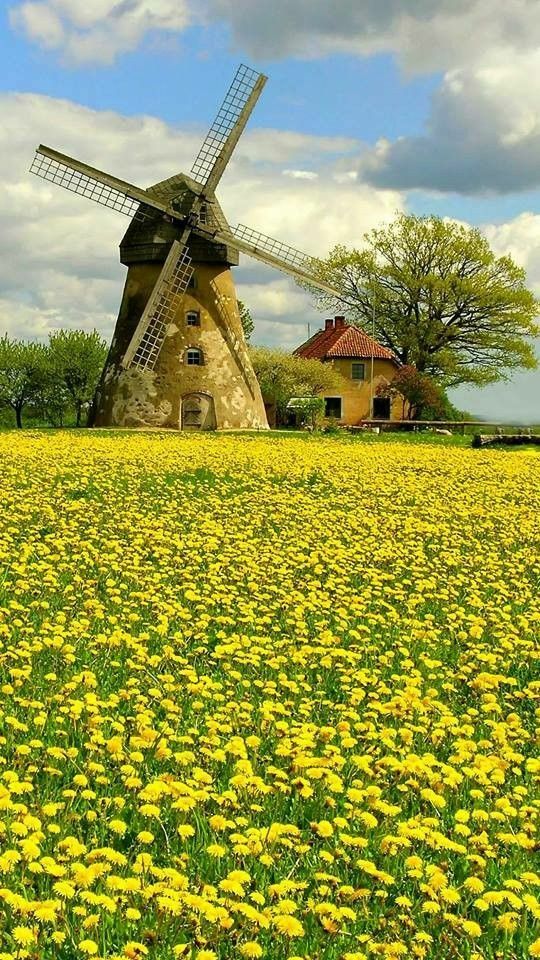
"My name is
Ventosus," cried the winged giant, "and I am ready to work for you, if
you will let me have my own way. I am not of the low disposition of my
brother, who plods on with the same uniform pace. I cannot help
sometimes laughing at his slow motion, and I amuse myself with ruffling
his placid temper, in order to make him jog on a little faster. I
frequently lend him a helping hand when he is laden with a heavy burden.
I perch upon his bosom, and stretching out my wings I move with such
rapidity as almost to lift him from the ground."
Jackson was
astonished to hear Aquafluens accused of sluggishness; he told Ventosus
what a prodigious quantity of work he had done for the colony.
"He is a snail
compared to me, for all that," holloed out Ventosus, who had sometimes a
very loud voice; and to show his rapidity he spread his wings, and was
out of sight in a moment.
Jackson was sadly
frightened, lest he should be gone forever; but he soon returned, and
consented to accompany Jackson home, on condition that he would settle
him in an elevated spot of ground.
"My house is built on the brow of a hill," said Jackson, "and I shall place yours on the summit."
"Well," said the
giant, "if you will get me a couple of millstones, I will grind you as
much corn in one hour as Aquafluens can in two. Like my brother, I work
without food or wages; but then I have an independent spirit, I cannot
bear confinement; I work only when I have a mind to it, and I follow no
will but my own."
"This is not such a
tractable giant as Aquafluens," thought Jackson; "but he is still more
powerful, so I must try to manage his temper as well as I can."
His wonderful form
and the lightness of his wings excited great admiration. Jackson
immediately set about building a house for him on the hill to grind corn
in, and meanwhile, Ventosus took a flight into the valley to see his
brother. He found him carrying a heavy load of planks, which he had
lately sawed, to their proprietor. They embraced each other, and
Ventosus, being in a good humor, said, "Come, brother, let me help you
forward with your load, you will never get on at this lazy pace."
"Lazy pace!"
exclaimed one of the children, who was seated on the load of wood on the
giant's back; "why, there is no man who can walk half or quarter so
fast."
"True," replied Ventosus; "but we are not such pygmies as you."
So he seated himself
beside the child, stretched out his wings, and off they flew with a
rapidity which at first terrified the boy; but when he found he was
quite safe, he was delighted to sail through the air almost as quickly
as a bird flies. When they arrived, and the wood had been unloaded,
Aquafluens said, "Now, brother, you may help me back again."
"Not I," said
Ventosus; "I am going on, straight forward. If you choose to go along
with me, well and good; if not, you may make your way home as you
please."
Aquafluens thought
this very unkind, and he began to argue with his brother; but this only
led to a dispute. Aquafluens' temper was at length ruffled; Ventosus
flew into a passion: he struggled with his brother, and roared louder
than any wild beast. Aquafluens then lost all self-command, and actually
foamed with rage. The poor child stood at a distance, trembling with
fear. He hardly knew the face of his old friend, so much was his
countenance distorted by wrath; he looked as if he could almost have
swallowed him up. At length, Ventosus disengaged himself from his
brother, and flew out of his sight; but his sighs and moans were still
heard afar off. Aquafluens also murmured loudly at the ill-treatment he
had received; but he composed himself by degrees, and, taking the boy on
his back, slowly returned home.
Jackson inquired
eagerly after Ventosus, and when the child told him all that had
happened, he was much alarmed for fear Ventosus should never return; and
he was the more disappointed, as he had prepared everything for him to
go to work. Ventosus, however, came back in the night, and when Jackson
went to set him to work in the morning, he found that nearly half the
corn was already ground. This was a wonderful performance. Yet, upon the
whole, Ventosus did not prove of such use to the colony as his brother.
He would carry with astonishing quickness; but then he would always
carry his own way; so that it was necessary to know what direction he
intended to take, before you could confide any goods to his charge; and
then, when you thought them sure to arrive on account of the rapidity
with which they were conveyed, Ventosus would sometimes suddenly change
his mind, and veer about with the fickleness of a weathercock; so that
the goods, instead of reaching their place of destination, were carried
to some other place or brought to the spot whence they set out. This
inconvenience could not happen with regard to grinding corn; but one of
no less importance often did occur. Ventosus, when not inclined to work,
disappeared, and was nowhere to be found.
The benefit derived
from the labor of these two giants had so much improved the state of the
colony that not only were the cottages well floored, and had good doors
and window-shutters, but there was abundance of comfortable furniture -
bedsteads, tables, chairs, chests, and cupboards, as many as could be
wished; and the men and women, now that they were relieved from the most
laborious work, could employ themselves in making a number of things
which before they had not time for. It was no wonder, therefore, that
the desire to discover more giants was uppermost in men's minds.
They were always
asking Aquafluens about where they could find another giant, for he was
ever with them and never flew away, so they could always ask questions;
while Ventosus used to fly away and disappear if they bothered him with
questions which he did not like to answer.
They hunted high and
low for more giants, but they found none. The heart of Aquafluens was
grieved within him, that they should seek so much for a giant that did
not need always to go down hill. So one day, after much doubt, he told
Jobson that there was another giant who was stronger than he, and much
more constant and regular in his work than Ventosus, who was here today
and away tomorrow, and whom you could never be sure of. This giant was
the strongest of all giants, but he was also dangerous.
"I will then have nothing to do with him," said Jobson.
"Well," said Aquafluens, "if you know how to manage him he will work for you."
"Can he go up hill?" said his little boy.
"As easily as I can go down," said Aquafluens.
"And who is this giant?" said Jobson.
"Alas," said Aquafluens, mournfully, "he is my own son."
"Where is he?"
"You can only bring him by a charm, and if you are not very careful, he may burst out and kill you."
"Is he so very violent?" said Jobson.
"Very. His breath is scalding hot, and he is a more expensive giant than either my brother or myself."
"Must you pay him, then?" said Jobson's wife.
"He will work
without pay, but he needs to be kept hot. He will not work at all unless
he is seated right on the top of blazing coals."
"What a funny giant!" said Jobson's little boy. "Does he not burn up?"
"No, the hotter you make the fire the stronger he grows, but when the fire grows cold, all his strength seems to die."
The Jobsons had a
long talk over this, and decided that they had better not have anything
to do with this strange giant. But once, when they wanted a great deal
of heavy stones carried up the hill, they were driven to ask Aquafluens
if he would tell them the charm.
"Yes," said he; "it is very simple, but you must not be afraid."
"No," said they, "we will not be afraid."
"Then take a little of my blood."
"Never!" said Jobson's wife.
"No, you do not need to be afraid," said Aquafluens; "you only need to take a very little."
"And what must we do with it?"
"You must put it into an iron pot, and then put it on the fire."
They were very loth
to do this; but at last, their need being great, they did so. They were
relieved to find that the taking of his blood did not seem to hurt the
good, kind giant, and then they put the pot on the fire, and waited to
see what would happen. After a time, they heard a singing noise, and
they began to be frightened. At last out of the pot there came a cloudy
vapor, which rose higher and higher and higher, until it went away. But
they saw no giant.
So they went to
Aquafluens, and told him that the charm would not work. He asked them
what they had done, and they told him, and he said, "But did I not tell
you my son would never work unless you put him in prison? I will give
you some more of my blood, and you must put it in an iron pot and put
the lid on, and fasten it down tight, and then see what will happen."
So they did as the
good giant said. They took some more of his blood, put it into the iron
pot, and put on a heavy lid, and fastened it on tight, then they put it
on the blazing fire, and waited. This time they were terribly
frightened, for after a time the iron pot burst into a thousand pieces,
and blew all over the place, hurting Jobson's wife on the head, and
cutting Jobson's hand. So they ran away frightened and told Aquafluens.
"Ah," he said, "I
told you my son was a dangerous child, but he is very strong, and if you
give him nothing to do he does mischief. So you must give him a handle
to turn. If you do that, he will not burst anything, but will turn the
handle as hard as ever you like."
And they did just as
the giant told them, and they found that everything happened just so,
for the new giant, whose name was Vaporifer, was a strong and willing
worker. Up hill and down dale made no difference to him. He could carry
and do everything they gave him to, but they must keep him hot, and they
must give him a wheel to turn. If at any time he stopped they had to
let him get out, otherwise, if he had no wheel to turn, and could not
get out, he would blow his prison to pieces.
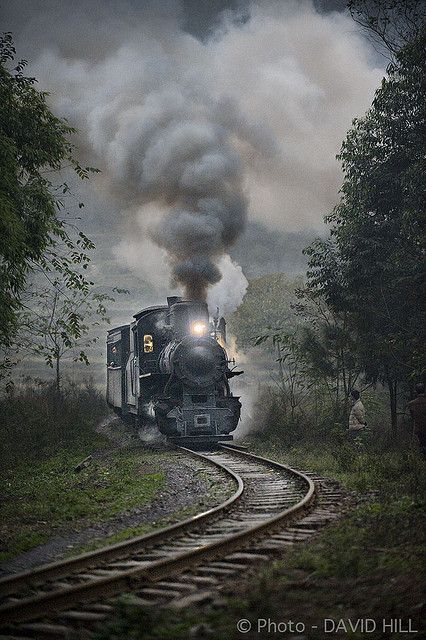
Thus it came to pass
that Ventosus was wanted very little, for Jobson and his friends liked
Vaporifer, who was regular and steady in his ways, and could be relied
upon always to do what was wanted.
Aquafluens was still
the most useful and the cheapest of all the giants, but his son
Vaporifer was much stronger and more handy than his father. Nor was
there any limit to what he could do if only they would give him plenty
of heat and always let him have a wheel to turn.
***
Now, then, who do
you think were these three giants? Perhaps you have already guessed from
their names, and from their description. The first giant, Aquafluens,
is the great giant of running water, which will always run down hill,
but which comes to a standstill on level ground, and cannot go up hill,
no matter what happens. It is this great giant which turned all the
water-mills, which ground the corn, and sawed the wood, and did all
manner of work. Ventosus, his brother, is the wind which bloweth whither
it listeth, and sometimes, lashes the water into stormy waves. While as
to that of Vaporifer, you surely understand that it is nothing else but
steam. These three giants are real giants who are still doing their
work day by day, and every day. There are no servants of man who have
worked so cheaply, so untiringly, and so well.
